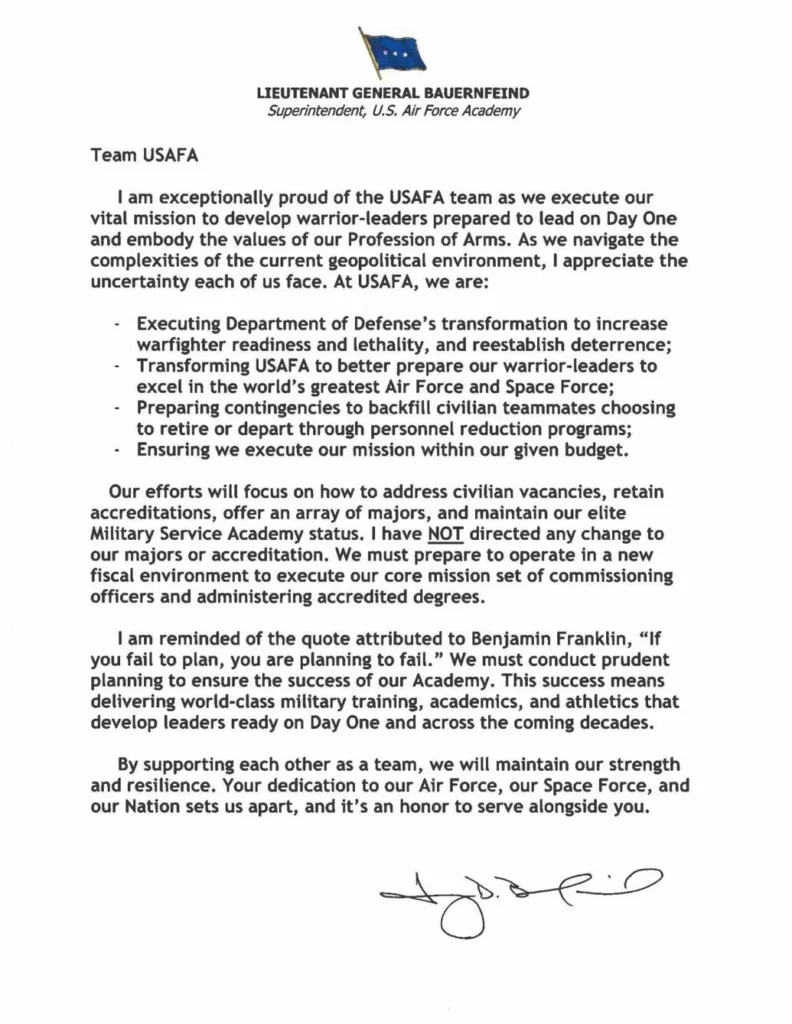Democratic lawmakers urge DOD to provide details on Air Force Academy faculty cuts

Proposed civilian faculty cuts at Air Force Academy raise alarms over critical engineering programs
Air Force Academy cadets watch the deployment of Falcon SAT-X on SpaceX’s Falcon 9 from the Department of Astronautics Space Systems Research Center. The satellite launched at Vandenberg Space Force Base in California in November 2023.
The prospect of laying off civilian faculty members at the Air Force Academy is driving concern from faculty about the future quality of the school’s engineering programs.
An internal academy communication last week said Superintendent Lt. Gen. Tony Bauernfeind was proposing cutting civilian faculty positions. All of those staff members have doctoral degrees because the institution only hires civilian faculty with doctoral degrees.
A letter the academy released publicly this week did not mention layoffs, but stated the institution was preparing to operate in a new fiscal environment and needed to be prepared to backfill civilians planning to retire or resign.
In response to questions from The Gazette, AFA staff said the academy has been operating above its civilian pay budget for the past several years, and will take necessary measures to be within budget.
On April 7, the Department of Defense reintroduced a resignation program similar to the Fork in the Road program introduced across the federal government earlier this year. The Department of Defense offered to pay civilian employees through Sept. 30 if they resign and gave them until Monday to decide.
The Department of Defense is aiming to reduce its civilian workforce 5%-8%, according to a news release.
However, instructors are concerned cuts to civilian faculty could harm cadets’ readiness to work on programs aimed at modernizing the Air Force with new weapons systems.
In a few years, pilots of F-35s could have a team of drones flying alongside them, taking on more risky tasks.
It’s a vision that will take highly educated Air Force officers to ask contractors questions and oversee the process to developed the unmanned systems that will be used in the next war.
Newly commissioned officers will also need the skills to keep the Air Force’s large collection of aging airplanes flying
At the Air Force Academy, a mix of military and civilian professors, including veterans, ensures graduates have those technical skills, professors said.

Air Force Academy Superintendent Gen. Lt. Tony Bauernfeind released a letter about potential staff reductions.
“One of the roles that civilians play is keeping the education they are getting here relevant to what they would need as they move forward to leading Air Force relevant research,” said a professor who declined to be named for fear of retaliation.
The school employs 491 faculty members, with 308 uniformed members and 183 civilians, the internal communication said.
If the academy cut many civilian positions, without replacing them, it could force the school to cut some majors, the internal academy communication said. In the recently released letter Bauernfeind said he has not directed any changes to majors and the school was planning contingencies to backfill civilian employees preparing to retire or resign.
Should changes to majors happen, the academy will work with individual students, the academy said in an email.
The academy said on its website that about 60% of cadets graduate with degrees in science and engineering. The remaining 40% graduate with degrees in social sciences and humanities.
Some of the key engineering degrees include aeronautical, astronautical, computer, systems and mechanical engineering and all are accredited by ABET, formerly known as the Accreditation Board for Engineering and Technology, according to the academy’s website.
The loss of professors holding doctoral degrees could lead to programs losing their accreditation and make it tough to attract top engineering candidates, professors said. There is also fear that the top freshmen and sophomores might transfer out of the programs, they said. The instructors spoke on the condition of anonymity to avoid retaliation.
The loss of accredited programs also could hurt cadets’ chances at getting into graduate school, professors said.
The superintendent said in his letter he had not directed any change in accreditation and administering accredited degrees is part of the school’s mission. The academy said in an email the accreditation is a sign of the quality education available at the academy.
Universities and colleges must earn program accreditation through outside observation.
The accreditation process through ABET examines numerous aspects of a program, including the qualifications of faculty members and whether they are sufficient to achieve the student learning outcomes.
“We do not prescribe specific academic credentials or faculty numbers that must be met to satisfy this requirement. We do note, though, that the competence of faculty members may be judged by multiple factors including education, engineering experience, teaching effectiveness, and/or licensure as Professional Engineers, among others,” Ann Kenimer, the chief accreditation officer for the group, said in an email.
While layoffs at an institution can impact every area ABET evaluates, the accreditation group takes into account how staff losses are managed and addressed, explained Ying Shang, the dean of the College of Engineering and Applied Science at the University of Colorado Colorado Springs. Shang holds her doctorate in electrical engineering and has evaluated engineering programs for ABET for five years.
The accreditation process also evaluates the student learning outcomes, whether students feel their needs are being met and whether the programs are achieving the program educational objectives and continuous improvement.
Low retention in an engineering program also can be a cause for concern, but the accreditation group doesn’t prescribe how colleges and universities achieve their goals.
“ABET has been really careful not to dictate how each university delivers their curriculum,” Shang said.
It is helpful to have sufficient and qualified faculty and staff to help guide the continuous improvements that schools tell ABET they are going to make, Shang said.
When programs don’t follow through on their own process, that’s often where ABET may cite the shortcomings, she said.
The accreditation process builds in long timelines for schools to address issues, so it can take more than six years to have accreditation revoked, Shang said.
By Mary Shinn mary.shinn@gazette.com
Updated
